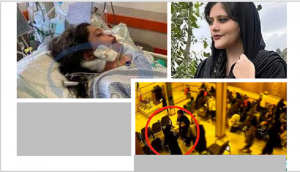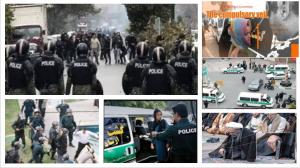(Video) Leaked Documents Unmask Regime’s Fear of Iran’s Uprising, and Tehran’s Tactics to Derail It
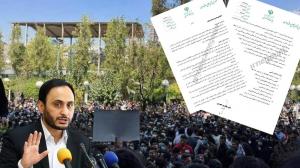
The nationwide uprising that erupted in September 2022 was a major blow to Iran’s clerical regime, posing an existential threat to it, according to a document published by dissidents that managed to breach the servers of the regime’s presidential offices on May 29.
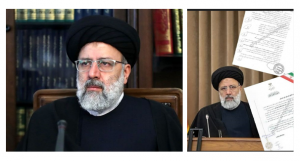
The published document issued by Ali Bahadori-Jahromi, the spokesperson of Ebrahim Raisi’s gov., to all cabinet members, instructing them on how to parrot false narratives about the popular protests and blame the regime’s adversaries for instigating the uprisings.
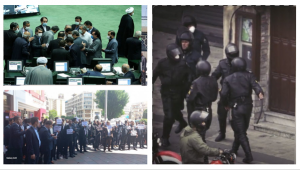
In his letter, Bahadori Jahromi underlines to “Provide full and comprehensive support for the military and police forces while condemning any actions that weaken the country’s security and condemn attacks against the IRGC, Basij, army, and police forces.”
The directive orders all officials to “Refrain from making decisions or announcing negative and alarming news about the high cost of goods and services."
The newly published document is a directive issued by Ali Bahadori-Jahromi, the spokesperson of Ebrahim Raisi’s government, to all cabinet members, instructing them on how to parrot false narratives about the popular protests and blame the regime’s adversaries for instigating the uprisings.
The letter acknowledges that the nationwide uprising is seated in much deeper issues than hijab and morality-related problems or the death of Mahsa Amini, a young girl who was murdered by the regime’s morality police in September.
“The enemy’s main goal is to undermine the principles of independence and authority in Islamic Iran and hinder progress,” the directive claims, tacitly saying that Iranians, which the regime describes as “enemy,” want the regime’s downfall.
Since the beginning of the uprising, some self-proclaimed opposition figures and groups have been promoting “civil disobedience” and “non-violent” means of protests, thus, downgrading the Iranian people’s right to self-defense in the face of the regime’s increasing brutality to blind and unprovoked “violence”.
In his letter to cabinet members, Bahadori Jahromi underlines to “Provide full and comprehensive support for the military and police forces while condemning any actions that weaken the country’s security and condemn attacks against the IRGC, Basij, army, and police forces.”
In other words, wittingly or unwittingly, those so-called “dissidents” accusing Iranian people of violence while counting on the regime’s military forces as a force for change are indeed following the regime’s agenda and guidelines.
While acknowledging the restiveness of Iran’s society, the directive orders all officials to “Refrain from making decisions or announcing negative and alarming news about the high cost of goods and services, as well as social restrictions, especially in the current situation.”
“If there is a possibility that certain decisions may carry a negative charge and sensitize public opinion, it is necessary to coordinate with the government’s information council before implementation and notification,” the letter reads.
The full translated text of the leaked document is below:
Dear cabinet members,
Greetings and regards.
In light of the recent statements made by the Supreme Leader of the Islamic Revolution regarding the events and the attempts of enemies to disrupt the country’s order and security, it is crucial to adopt unified media measures and a cohesive stance on these matters.
The following policies and considerations need to be taken into account by all esteemed members of the government cabinet and institution managers:
Positive policies:
1. Organize internal meetings with experts to discuss the nature of the recent riots and the anti-national goals behind them. Provide comprehensive support for specialized activists and engage in explanatory discussions based on the recent report from the Ministry of Information.
2. Emphasize the unity of Iran as the key response to separatist conspiracies. Shed light on the role played by separatist groups in Kurdistan, West Azarbaijan, Khuzestan, and Sistan and Baluchistan during the recent events.
3. Highlight the enemy’s plans, orchestrated by the United States and the Zionist regime, to create insecurity and chaos in Iran. Address the attempt to exploit the untimely death of Amini as a means to incite public sentiments before October and the reopening of schools and universities.
4. Recognize the main motive behind the enemy’s support for recent disturbances: the observation of Iran’s progress in recent times and the country’s rapid movement towards strength and independence.
Highlight the round-the-clock efforts of the people’s government, officials in the legislative and judicial branches, and the support of the honorable people of Iran.
5. Emphasize and clarify that the recent hijab and morality-related protests, as well as the unfortunate death of a young girl, are not the core issues. The enemy’s main goal is to undermine the principles of independence and authority in Islamic Iran and hinder progress.
6. Provide full and comprehensive support for the military and police forces while condemning any actions that weaken the country’s security. Condemn attacks on the Islamic Revolutionary Guards Corps (IRGC)2, Basij, army, and police forces.
7. Distinguish between peaceful street protesters and rioters and outline appropriate measures for dealing with each group. Acknowledge that those who did not engage in acts of corruption and vandalism on the streets were not enemies of the Iranian nation, whereas those who participated in activities that harmed national security deserve condemnation.
8. Highlight the achievements and advancements of women in various fields, such as science, education, sports, culture, medicine, and health. Introduce successful women who emerged during the Islamic Revolution and compare their status to that of women before the victory of the Iranian Islamic Revolution.
9. Draw attention to the deceptive and duplicitous behavior of foreigners and the Western media concerning events in Iran. Compare such behavior to similar cases in America and Europe, providing examples of injustices and crimes against Muslim women, people of color, racial minorities, natives, immigrants, and asylum seekers.
10. Conduct interviews, discussions, and speeches that reflect positive and promising news. Communicate the successful outcomes achieved by Iran in various fields for the people’s awareness.
Negative policies:
1. Refrain from making any comments regarding the cause of late Mahsa Amini’s death until the final opinion of the Forensic Medicine Organization, an independent and professional institution, is announced.
2. Avoid making statements that contribute to the creation or intensification of polarization within society.
3. Refrain from making decisions or announcing negative and alarming news about the high cost of goods and services, as well as social restrictions, especially in the current situation. If there is a possibility that certain decisions may carry a negative charge and sensitize public opinion, it is necessary to coordinate with the government’s information council before implementation and notification.
4. Avoid adopting confrontational positions towards artists and athletes whose loyalty to Islamic Iran has been proven through their artistic, sporting, and social records.
Sincerely,
Ali Bahadri Jahormi
Shahin Gobadi
NCRI
+33 6 61 65 32 31
email us here
WATCH NOW: Iranian Regime’s Presidency Websites Disrupted, Classified Documents Obtained at http://www.youtube.com/watch?v=7kW1sFHzMVM

1 https://www.ncr-iran.org/en/about-ncri/ncri/alternative/
2 https://www.ncr-iran.org/en/news/terrorism-a-fundamentalism/inside-irans-army-of-terror-and-oppression-revolutionary-guards-irgc-part-2/

